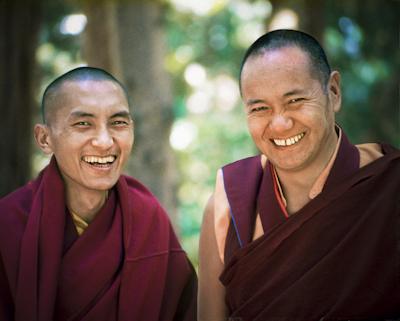Dear LYWA friends and supporters,
Thank you so much for your continued interest and support. We are happy to tell you about the new books and teachings we have made available to you over the past month, and about the many exciting projects we have in the works. Please help us spread the Dharma! Share our newsletter far and wide.
New Teachings from the Archive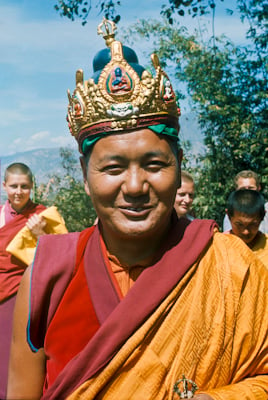 We have just posted a teaching from Lama Yeshe, The Perfect Object of Refuge, given at Manjushri Institute in Cumbria, England, in September 1976. In this teaching Lama talks about the proper way to take refuge and its benefits. This teaching also appeared earlier this year in Mandala Magazine.
We have just posted a teaching from Lama Yeshe, The Perfect Object of Refuge, given at Manjushri Institute in Cumbria, England, in September 1976. In this teaching Lama talks about the proper way to take refuge and its benefits. This teaching also appeared earlier this year in Mandala Magazine.
Read a new excerpt from Big Love, the biography of Lama Yeshe, on our Big Love blog. This excerpt is also from 1976, and includes a portion of at teaching Lama gave at Manjushri Institute on karma.
We have just posted the transcript of Lama Zopa Rinpoche's public talk given at Conway Hall in London, England this past July, Taking Care of the Mind. In this talk Rinpoche teaches on how to bring peace and happiness to oneself and others. Lightly edited by Sandra Smith. You can listen to this teaching online, or download the mp3 to listen to anywhere, from our website. And, you can view a video of this teaching on the FPMT's Livestream page.
This month's eletter teaching (below) is excerpted from the London public talk. Transcripts of the formal teachings Rinpoche gave at Jamyang Buddhist Centre on the days following the public talk are forthcoming.
New Advice from Lama Zopa Rinpoche
Rinpoche sent this card with advice to a student who was doing many nyung näs:
 "This mouse is so small and is in great danger, but the elephant can change its mind at any time; it can take its leg off and free the mouse.
"This mouse is so small and is in great danger, but the elephant can change its mind at any time; it can take its leg off and free the mouse.
"Just like that we are in samsara. We came from the lower realms just now; the lower realms were our permanent residence and we are just about to go back there, but because of Dharma practice—especially the practice of nyung näs that you are doing, being guided by Chenrezig —we can be free from the lower realms and even free from samsara, delusion and karma. We can achieve full enlightenment and then fully enlighten the numberless hell beings, hungry ghosts, animals, human beings, suras, asuras and intermediate state beings."
Read new advice from Rinpoche regarding the ebola virus, where Rinpoche advises building a statue and reciting mantras of the Naga King. There are also new advices this month on the Middle East conflict, waking up from samsara, and a letter of thanks to students who have produced Dharma books, where Rinpoche says:
This is making FPMT more and more beneficial for sentient beings, and the teaching of Buddha is more and more alive, not dying. It is bringing skies of temporary happiness to all the sentient beings and ultimate happiness, liberation from samsara, and full enlightenment to all the sentient beings. It is bringing sentient beings in the right path to enlightenment, to Lama Tsongkhapa. Wow, wow, wow, wow, wow! Rejoice, you can die happily, when you have to die.
You can read all new advices added in September here.
New Book Projects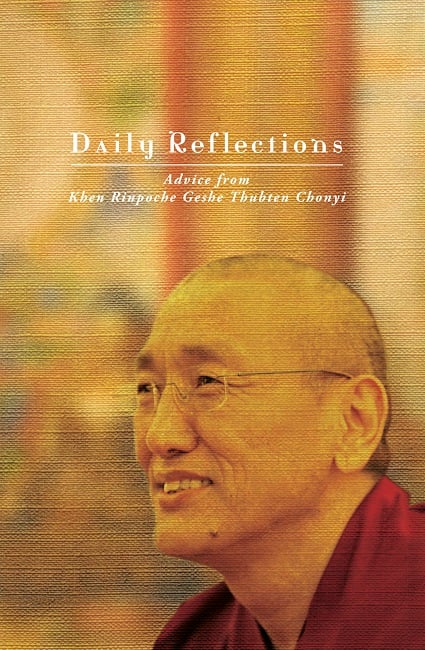 We have published another ebook in partnership with Amitabha Buddhist Centre! Daily Reflections offers profound advice by Khen Rinpoche Geshe Chonyi related to our Dharma studies and practice, including how to check whether our practices are Dharma, the need for study and constant reflection of the Buddha’s teachings and how to overcome our afflictions and problems so that we can truly benefit others. Khen Rinpoche Geshe Chonyi has been the resident teacher of Amitabha Buddhist Centre since October 1999.
We have published another ebook in partnership with Amitabha Buddhist Centre! Daily Reflections offers profound advice by Khen Rinpoche Geshe Chonyi related to our Dharma studies and practice, including how to check whether our practices are Dharma, the need for study and constant reflection of the Buddha’s teachings and how to overcome our afflictions and problems so that we can truly benefit others. Khen Rinpoche Geshe Chonyi has been the resident teacher of Amitabha Buddhist Centre since October 1999.
This book is the third in the collection of ebooks we have published for ABC, including Venerable Lama Ribur Rinpoche's How to Generate Bodhichitta and Khensur Rinpoche Lama Lhundrup Rigsel's Commentary on Praises to the Twenty-one Taras.
If you are a Member, you can freely download ebooks versions of these and all other LYWA publications in our Members Area.
Looking ahead, we are working on a new ebook series of Lama Zopa Rinpoche's teachings from the 24th Kopan lamrim course from 1991. The series will consist of four volumes and the first, titled Practicing the Unmistaken Path, will be available for download by November.
CPMT and Retreat in Australia
FPMT's international meeting, CPMT, in Australia has ended successfully. And now the month-long retreat with Rinpoche has begun, which includes teachings on Shantideva's Bodhicaryavatara—A Guide to the Bodhisattva's Way of Life. You can read teachings from Rinpoche on Shantideva during the 1981 Kopan course here.
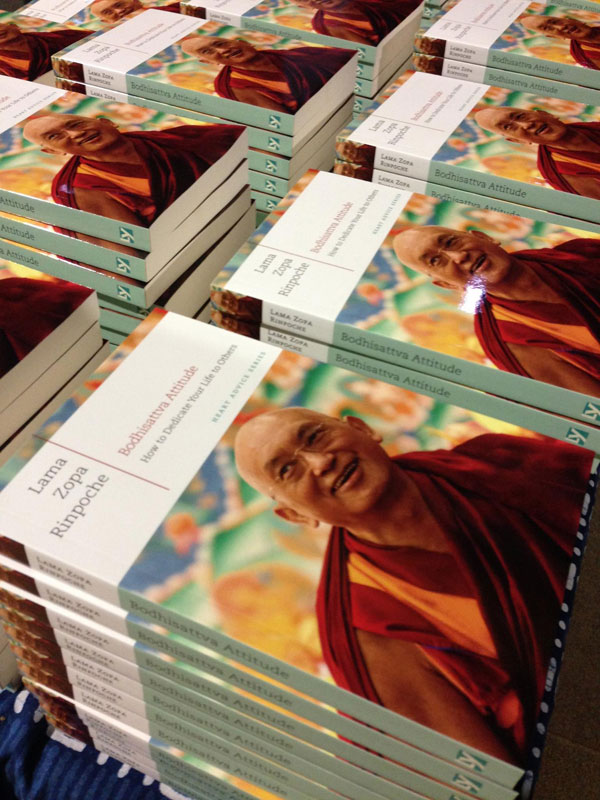 During CPMT Rinpoche gave a public talk on "The Bodhisattva Attitude" and LYWA offered free copies of Bodhisattva Attitude to all that attended the talk. Even if you couldn't attend, you can still get your very own copy of Bodhisattva Attitude here for free plus shipping.
During CPMT Rinpoche gave a public talk on "The Bodhisattva Attitude" and LYWA offered free copies of Bodhisattva Attitude to all that attended the talk. Even if you couldn't attend, you can still get your very own copy of Bodhisattva Attitude here for free plus shipping.
We are so grateful to all who have offered support to the LYWA Dharma Book Printing Fund! You can still make a donation to help us produce even more of these free Dharma books for the benefit of all.
If you missed CPMT you can visit FPMT's livestream page to watch recordings of Rinpoche’s talks and the long life puja. Also, check out Mandala Magazine editor Laura Miller's blog on the Mandala website which has an account of each day's events and many fabulous pictures. And our very own Wendy Cook represented LYWA at CPMT and sent us candid images which we were happy to share wirh our Instagram and Facebook social media communities.
LYWA is Launching a New Website in 2015
In the coming months we will start giving you more details about our new website. We have been hard at work on a new and improved design that will make it easier to find what you are looking for. If you have experience in html or Drupal and can volunteer to help move content over to the new site, please email IT Director Jen Barlow.
Thank you again for your kindness and incredible support.
Much love, 
Nick Ribush
Director
This Month's Teaching: Taking Care of the Mind
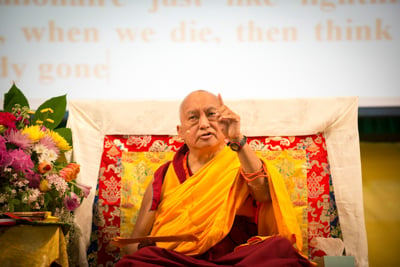 Thank you very much, everybody, those whom I met in the past, and who I met in the past lives. Well anyway, everyone whom I met in the past, in this life or past lives, the reason why we’re gathered here is because we met in past lives or past times. So we meet again here today. So thank you very much everyone for coming here. I offer my best wishes to everyone, my brothers and sisters, and to everybody.
Thank you very much, everybody, those whom I met in the past, and who I met in the past lives. Well anyway, everyone whom I met in the past, in this life or past lives, the reason why we’re gathered here is because we met in past lives or past times. So we meet again here today. So thank you very much everyone for coming here. I offer my best wishes to everyone, my brothers and sisters, and to everybody.
So what are we going to think, what are we going to talk about? I think it’s most important in the world, most important—day-to-day life problems, hour-to-hour, day-to-day life problems, happiness; hour-to-hour problems, happiness; minute-by-minute happiness, problems; second-by-second happiness, problems; all this comes from our mind. Our problems and our happiness came from our mind, and even each minute, each second, happiness and pleasure came from our mind.
Sometimes in our life, when we’re in the situation, sometimes it makes you think, “Oh, if I think this way, it brings peace.” Sometimes you notice, “If I think this way, it brings peace to me and others. If I think this way, it harms the person—to me and to that person, doesn’t like, if I think this way, if I see this way.”
Sometimes it makes you aware of the moment-to-moment situation or how you’re going to act towards others. So you have total freedom in your hand—happiness and problems; to stop the problems and to bring peace, happiness to yourself and to others.
Sometimes uncontrollable anger arises and uncontrollable self-cherishing thought arises, self-concern, anger, pride also, but then sometimes it makes you aware there’s choice. There’s choice. You can choose. Sometimes you know you can bring happiness to the other person, but to hurt the other person, then you choose the other way, the wrong way of thinking, the anger. Sometimes you have choice, but still you want to hurt, so you choose the other way. Sometimes it happens like that. So that proves our mind is the creator of day-to-day life problems, happiness. It’s very clear.
So this life’s problems and happiness come from our mind, and then going beyond the happiness of this life. Then, of course, there is the suffering, the heavier suffering of the animals, the hungry ghosts, the narak beings—that’s Sanskrit—narak. In English, hell beings, in English language.
This all came from the mind, that we suffered, what we experienced in the past and will experience in the future, all comes from the mind. Peerless happiness, the state of omniscient mind, the total cessation of obscurations, the completion of all the realizations, sang-gye, the peerless happiness, also comes from our mind. It doesn’t come from outside; it doesn’t comes from temples or doesn’t come from outside.
It comes from our mind. Also samsara, the Sanskrit word, cyclic existence or circling, or the nirvana, the total, ultimate happiness, the blissful state of peace for oneself, the ultimate happiness, the total cessation of all oceans of samsaric sufferings, all comes from one’s mind.
As I mentioned already, every minute, every day, minute-by-minute, we have happiness or we have problems. If you think in a better way, if you think differently, of course, that problem is gone, there’s peace and happiness in the life if you think differently. Because you don’t change your mind, you don’t think differently, then all day long you have problems, day and night in the whole life.
Then you go to see a psychologist, you go to see a doctor, you go to see so many, then it makes your life so expensive, not only living—eating food and living in the house—not only that, then so much extra expenses. Wow, I don’t know, probably, I don’t know—thousands, hundreds of thousands, millions of dollars, I don’t know, but life is so expensive because you don’t take care of your mind. You don’t take care of your mind, you don’t take care of your life, and you don’t know how to take care of your mind.
Actually, meditation, Dharma practice—those are the best psychology. You have many different names, but it’s the best psychology, so many things, for the best healthy mind.
Excerpted from a public talk given by Lama Zopa Rinpoche in London, July 2014. Read the remainder of this talk, as well as access links to audio and video, on the LYWA website.
























